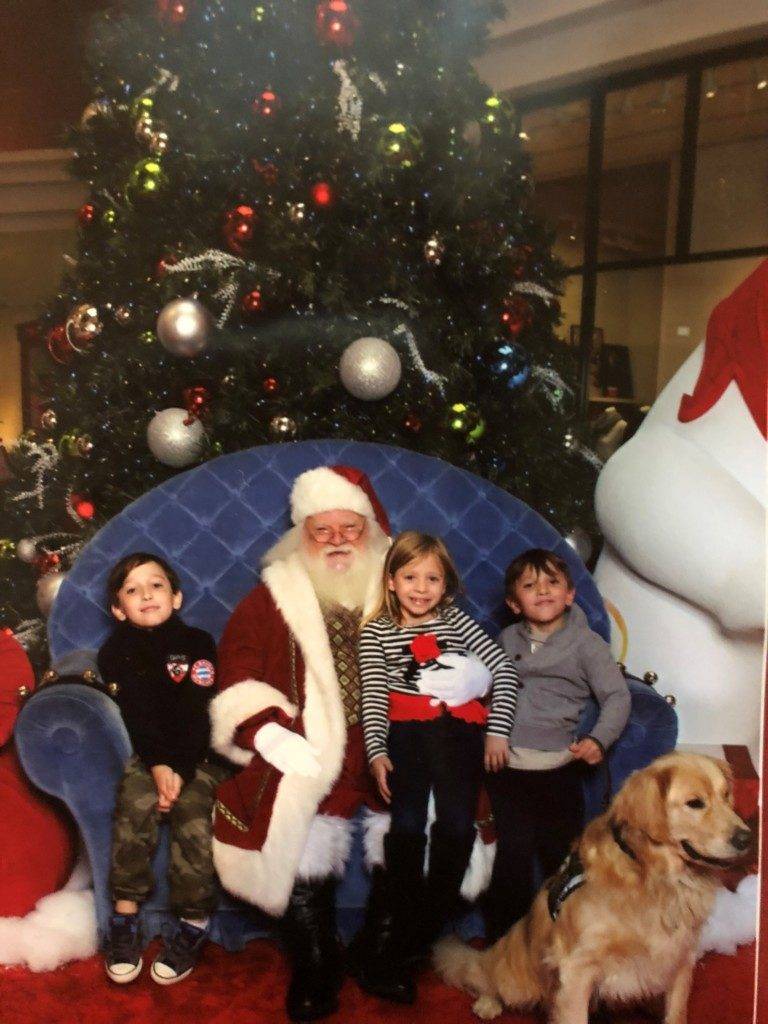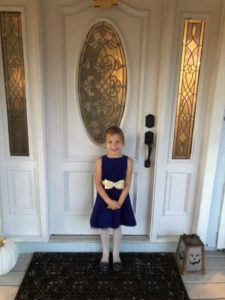
Ashton Fernandez couldn’t contain his excitement.
The 7-year-old was ready to decorate his yard with inflatable Christmas decorations with twin sister Audrey, and he bounded around his family’s living room with obvious glee. Diagnosed at an early age with autism spectrum disorder, Ashton communicates almost completely non-verbally.
He smiled wide and tugged at Audrey’s arm, imploring her to play until it was time to decorate their sprawling Lake Mary lawn. As he did so, Arlo, a laid-back golden retriever, sauntered through the room, casually taking in the pre-holiday cheer.
“Arlo is Ashton’s therapy dog,” said Jennifer Fernandez, Ashton and Audrey’s mother.
She is also the mother of 8-year-old David, who like his two siblings receives Florida’s Gardiner Scholarship for children with certain special needs – or unique abilities. (The scholarship is managed by Step Up Students, which hosts this blog.)
David was diagnosed with Asperger’s syndrome, while Audrey has growth hormone deficiency, which the scholarship covers because it is a rare disease as defined by the National Organization for Rare Disorders.
Without the scholarships, which cover home school curriculum, private school tuition, tutoring, and various therapies among other things, Jennifer Fernandez said she doubts that her children would have made significant academic and social strides over the last three years.
“I’m thankful that we get to use Gardiner in a variety of ways,” she said. “I home- schooled last year, and I don’t regret a moment. I feel the kids gained so much in every way. I was able to use different curriculums for each child.”
Ashton, who also has a mitochondrial disorder, is still home-schooled. He receives Applied Behavior Analysis therapy three days a week and undergoes occupational, speech and physical therapy. Symptoms of mitochondrial disorders include impaired growth, developmental delays and muscle weakness. The disorder is rare and there is no cure.
“He’s not even potty-trained yet,” Jennifer said. “I want him talking, but I want the potty training done, big-time. He knows what’s going on around him, I can tell, but having a conversation with him is extremely rare. And there are lots of behavioral issues. If he’s mad, he throws things around and is very destructive.”
Even with the scholarships, she said the family uses insurance and spends about $9,000 each year on private tutoring for Ashton and Audrey, as well as various therapies for all three children. It helps that Pedro Fernandez, Jennifer’s husband, runs a successful mill-working company that manages projects across the country.
As her mother spoke, Audrey climbed onto a chair beside her. Beneath her golden locks, Audrey flashed an wide, perhaps mischievous, smile and produced a toy spider. She made it crawl in a zig-zag pattern around the table.
“Spiders have eight legs,” she said.
Ashton was soon sitting beside his sister, his dark hair combed neatly to the side. Like his sister, he smiles often. He turned on an iPad and played upbeat music at a low volume. Jennifer has learned to read his body language to gauge his moods, interests and needs.
“By the time he was 2, we noticed he wasn’t hitting milestones and not talking,” said Jennifer, a mother of six whose oldest daughter is 19. “When I took him to the pediatrician, they always said he was developmentally delayed or speech impaired. He would also have these huge meltdowns that would last 15 minutes.”
For a while, Ashton was in a public pre-K program, but his mother said he was in a class taught by a long-term substitute teacher and did not make many gains. She now home-schools him, and he works with a tutor two days a week on top of his occupational and speech therapy.

Audrey has trouble writing and reading and was retained after attending kindergarten at a private school. She was home-schooled last year, but now attends Orangewood Christian School in Maitland, a private school about 30 minutes from their home. The school makes some accommodations for Audrey, such as letting her sit at the front of classes so she can focus. The family also pays to have a private tutor go to the school a couple times a week to work with her.
At Orangewood, Audrey, a first-grader, said she likes the engaging teachers and small class size. She is now meeting her academic targets.
“I think we have 17 kids in my class, including me,” she said.
Father Pedro described her kindergarten retention as a blessing in disguise. Since being accepted on the scholarship, he said she has “improved faster than one would ever thought possible. Her thirst for knowledge I believe is bigger than David’s at the same age.”
David, a third-grader who also attends Orangewood Christian, is extremely gifted, but not very social. On several tests, he has scored well above his grade level, but he has never had a birthday party, Jennifer said, because he never wanted one.
“He already knows he wants to go to Massachusetts Institute of Technology,” she said. “He won’t be a doctor, but he’ll definitely be developing something.”
David attended a neighborhood school for a while, but he was so anxious about being around other students and the typical classroom stimuli that Jennifer couldn’t get him out of the car some days.
“He’d be crying and we used to have to turn around and go home,” she said, adding that he has adapted well at Orangewood Christian, where he is in a program for gifted students.
Pedro Fernandez said the scholarships – and his wife’s patient perseverance – have been invaluable to all three children’s education.
“David flourishes in a program that demands outside-the-box thinking, situations that require individual advancement instead of in-the-box learning,” he said. “He loves science and reading to a point they improve much faster than his math education. The school he is in now pushes these skills, instead of being in a school that limits him to learning at the level of other students. His thirst for knowledge has only expanded and improved.”
The family now also has hope that Ashton will someday verbally communicate more effectively. But it’s a slow process.
“He is starting to talk a lot more, but it’s what he wants to say at random times,” Jennifer Fernandez said. “He’ll say, ‘Mommy plane.’ I’ll ask him if he wants mommy to go on a plane and he’ll nod. I don’t know if that means he wants me to go somewhere or if he wants us all to get on a plane and go somewhere.”
Ashton, a first-grader, uses an electronic communication device to help him choose words. That way, he can tell his mother when he’s hungry and which restaurant he’d like to go to.
“Ashton is the ideal case for Gardiner,” Pedro Fernandez said. “He requires full-on attention from his teachers and control by my wife. He has a thirst to control and learn things at his own rate. He surprises even his teachers on his abilities to make things happen the way he wants. He is non-communicative, but he does understand things and makes himself understood with the correct teachers and settings.”
Jennifer doesn’t like to think about where her children would be, academically and socially, without the scholarships.
“I can’t speak enough praise about how Gardiner has impacted our lives in such a huge way,” she said. “The scholarship has been a Godsend. Without this, there’d be no life.”


